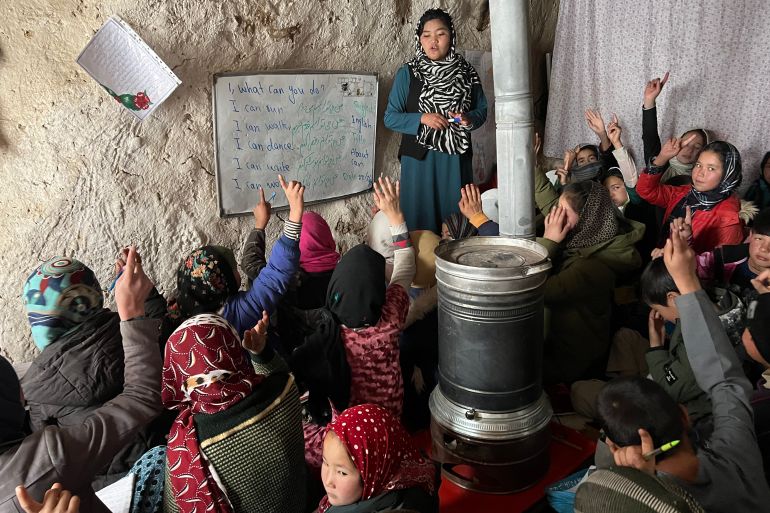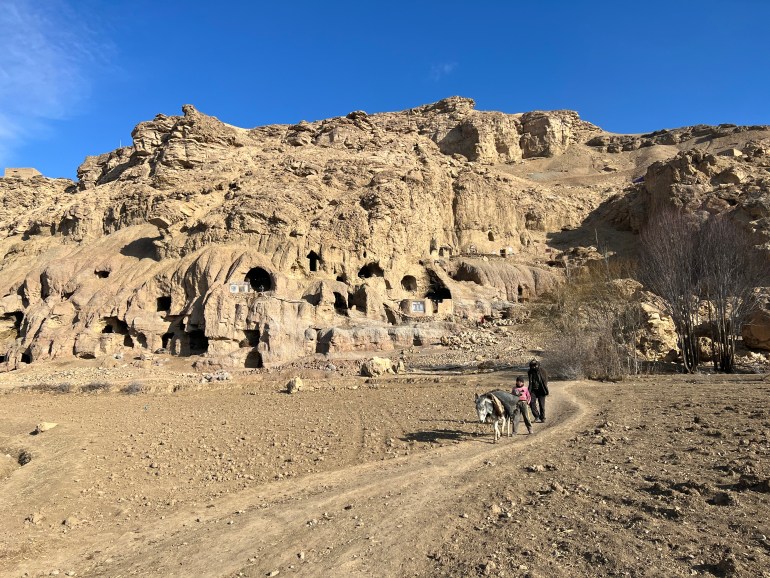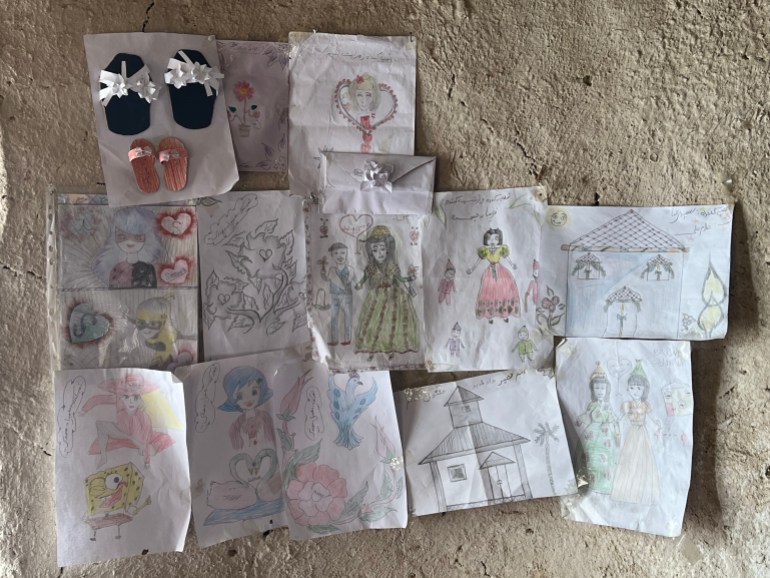In remote Bamiyan, a school run by an Afghan woman offers hope
The school, set up by a university graduate, runs for two hours daily, offering opportunity to an impoverished community.

Bamiyan, Afghanistan – It’s 6am and Freshta is sweeping the floor of her makeshift cave school in Bamiyan province of Afghanistan.
Donkeys descend the orange-dirt hills of her timeless village to fetch water, while cave homes awake to the smell of freshly baked flatbread.
Keep reading
list of 4 itemsIs the US stealing Afghanistan’s money?
Who should control Afghanistan’s foreign cash reserves?
Two foreign journalists detained on assignment for UN released
Up to 50 children, most of them girls, attend the informal school – not far from where historic giant Buddha statues were blown up by the Taliban 20 years ago.
The school runs for two hours daily in the morning offering an opportunity to the impoverished community at a time the country has been facing an unprecedented humanitarian crisis.
“The community suggested gathering the children and teaching them basic English, Dari, maths, geography and the holy Quran,” Freshta, who only gave one name, told Al Jazeera.
“It became something bigger, year after year,” the 22-year-old, who started the school at the age of 12, said, adding that students, ranging from ages four to 17, mostly come from the cave village of 50 families.
Taliban return to power
Freshta said she was scared after the Taliban armed group returned to power in August. The last time the Afghan group was in power between 1996-2001, it banned women from education and jobs.
“My school was lovely and colourful, but when the Taliban took over Bamiyan I was very scared and my friends suggested I take down all the posters and drawings on the walls. They thought I was in danger, especially because I taught girls,” Freshta said.
“I put all the colours and pens in a plastic bag and threw it in the river Patablaghman,” Freshta, wearing a coloured headscarf, said.
“They [Taliban fighters] came three times,” she added, “looking for my neighbour who used to work for the local police, but he’d already fled. I was afraid, but they didn’t seem to know about my school.”
Freshta is the only teacher and her work is voluntary. She sometimes received donations from occasional visitors from the capital Kabul, but the school has survived thanks to her hard work.
“People here have economic problems, they are either farmers or are unemployed and the school is completely free,” she said. “These families wouldn’t be able to afford a private school, and government schools are far.”
The literacy rate in Bamiyan is low, particularly among girls, some 25 percent of whom are literate, according to UN figures.
Freshta is the only university graduate of her cave-village, having finished a midwifery course from Bamiyan university a few months ago. Many of her students said they want to study to become a teacher like her.

Education for women
The drive to give to others comes from the sudden loss of her mother at the age of two, the same age as her little half-brother now, whom she likes holding and kissing. She has six much younger step-brothers but also a 20-year-old sister, who is married.
“[My mother] is always with me,” she said, explaining how much she always loved learning English, which she spoke fluently, and how she was sustained by the sense of humour of her father – a 60-year-old farmer.
The issue of education for women has been a particularly controversial issue since the Taliban seized power last August as US-led forces withdrew after 20 years of war, and the West-backed government of President Ashraf Ghani collapsed.
Western governments and aid agencies have been pressing the Taliban to do more on human rights, education of girls and women empowerment. The Islamic Emirate of Afghanistan, the name of the Taliban’s government, still faces diplomatic isolation.
Last month Zabihullah Mujahid, government spokesman and deputy minister of culture and information, said the education department would open classrooms for all girls and women in the Afghan New Year, which starts on March 21.
Asked by Al Jazeera for details, Mujahid referred to the core role of “Islamic principles” in structuring the future of girls’ education.
“Islamic principles have a more technical aspect in this regard. [Women] should be physically and mentally safe when studying. Transportation issues should also be considered and the financial aspects, too. [Men and women] should be separate, to unite all the girls and women in the whole Islamic Emirate,” he said by email on January 25.
Addressing a key issue for Western governments in considering the resumption of aid to Afghanistan, Mujahid told Al Jazeera that “all stages of education will resume”. This would happen “according to the capacity and facilities of the Ministry of Higher Education and the Ministry of Education”, he added.

Doubts over the Taliban’s intentions remain, however, with memories still strong of the severe restrictions imposed on women during their earlier stint in power.
Worsening economic situation
The imposition of sanctions and the sudden freezing of international aid, on which Afghanistan had been dependent for years, have hit hard particularly the people of Bamiyan many of them from the Hazara minority who have historically suffered persecution.
The United Nations has warned that more than half the people of Afghanistan’s 38 million people are at risk of food insecurity.
The worsening economic situation has hit hard the village of the young teacher, who said most people are unemployed now. “This has been the biggest change here, in the past months,” she said.
Freshta plans to find a job as a midwife as her father has struggled to make ends meet. She often also sells self-embroidered handkerchiefs in the local baazar to earn extra income.
Shopkeepers in Bamiyan – one of the coldest and poorest provinces – have reported plummeting sales and many young men say there are no jobs.
Local authorities have been following the Taliban national leadership with respect to school, and have so far turned a blind eye to realities such as Freshta’s school, which has survived in a cave, hidden away from the Taliban who were dealing with more urgent economic issues.
The school has attracted pupils from other villages, too, and parents were aware that this is much more than a way of filling time.
Aaela (not her real name) is the mother of a 16-year-old boy who cycles from another village that forms part of a unique landscape of snowy mountains and mud-brown valleys scattered with archaeological remains dating as far back as the first-century ancient Bakhtria, when the valley was rich in Buddhist monastic settlements and Buddhist art, as well as fortifications from the later Islamic period.
“I don’t have any money left: I used to work as a cleaner for a doctor, but he left. All the rich people of Bamiyan left, and now there are no jobs, and less money,” she said.
Aaela is a widow and has four other older children, who all left for the capital Kabul. “I hope his future will be better, thanks to the school,” she said referring to her son studying under Freshta.
Before standing to recite by heart a love poem in Dari language, one of the girls explained the importance of the school to her.
“I want to become a pilot,” Laleh said, sitting in the middle of the crowded room.
“Before coming to the school, I couldn’t read or introduce myself in English, now I can and I hope to do what I dream of.”
In the classroom, the English lesson is started again. It \was all about the verb “can”: “I can run, I can walk, I can write, I can work,” the class repeated in unison after their teacher.
